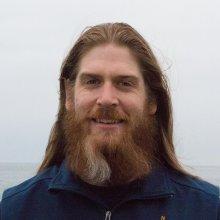
Drew Stevens
Tell us about your work / research. What kinds of things do you do?
I'm a Ph.D. student in computer science and a graduate research assistant at the Data Visualization Research Lab at the Center for Coastal and Ocean Mapping. My main interest is in using human perceptual theory to develop new and effective ways to present and interact with data. I am currently researching ways in which virtual reality (VR) and augmented reality (AR) can be used on- and off-ship to help out scientists and mariners. For example, a navigator on the ship bridge wearing augmented reality glasses could see virtual markers tied to real-world buoy positions, shipping lanes, cross currents, and other important information that could help the navigator complete the task at hand more efficiently and safely than practices currently in use.
What sparked your initial interest in your career?
I discovered the field of data visualization while working at an environmental consulting company in Oakland, CA. One of my mentors lent me the book Beautiful Evidence by one of the pioneers of modern data visualization, Edward Tufte, and it opened my eyes to the world of visualization as an academic area of study and research. I started reading as much as I could find about data visualization, which eventually lead me to apply to the Data Visualization Research Lab at CCOM.
Who influenced you or encouraged you the most?
My fifth-grade teacher, Rick Kleine, was an incredibly passionate educator who had a gift for helping students see and realize their potential. He used many non-traditional teaching methods to challenge us individually and as a class to foster our academic learning, social skills, and sense of ethical responsibility. Many of the lessons I learned in his class have stuck with me throughout my life; the skills he helped me to develop as his pupil have played a significant role in allowing me to achieve my goals.
What element of your work / study do you think is the most fascinating?
One of the coolest things I've been involved with recently is building a virtual model of the UNH pier in New Castle, New Hampshire. My advisor used photogrammetry (reconstructing 3D objects from multiple 2D images) to recreate the shoreline features along New Castle, and I used a high-definition 3D laser scan of CCOM's new research vessel to hand-model an almost exact digital replica of the ship’s bridge. This will allow us to conduct ship-based studies utilizing the virtual ship bridge, and it also has the added benefit of giving visitors to the Center the experience of being on our new vessel at the New Castle pier without actually being there.
What other jobs led you to your current career?
When I was fresh out of college I moved to Los Angeles to find a job in the music industry and ended up at a small company that produced and sold wedding music online (think sappy Disney-style songs with a wedding theme). Though this wasn't the area of the music industry I had envisioned being involved with, the fact that it was a small company allowed me to move up quickly and eventually become the lead programmer and web developer there. (And no, I was never a wedding singer.) The technical skills I acquired along with developing the motivation to tackle problems I had no idea how to solve provided the foundations for my future endeavors.
What are your degrees and certifications?
Bachelor of Arts in Music Composition -- University of California, Davis 2007; Masters of Science in Computer Science -- University of New Hampshire 2017
What are your hobbies?
I can't seem to find much free time these days, but when I do manage to get some time away I enjoy being out in nature with my girlfriend and our dog or practicing Tuvan throat singing.
What advice would you give to someone who wants to have a career like yours?
As someone who has followed a very non-traditional path to get to where I am, my biggest piece of advice is to be relentless in pursuing your interests. Do not become discouraged when you can’t see a clear path to your goal; sometimes by pushing forward in any direction, you can end up in a place that gives you an even better perspective of your objective. The important part is that you just keep moving forward.
Expeditions
Drew participated in the following Ocean Exploration Trust expeditions:
